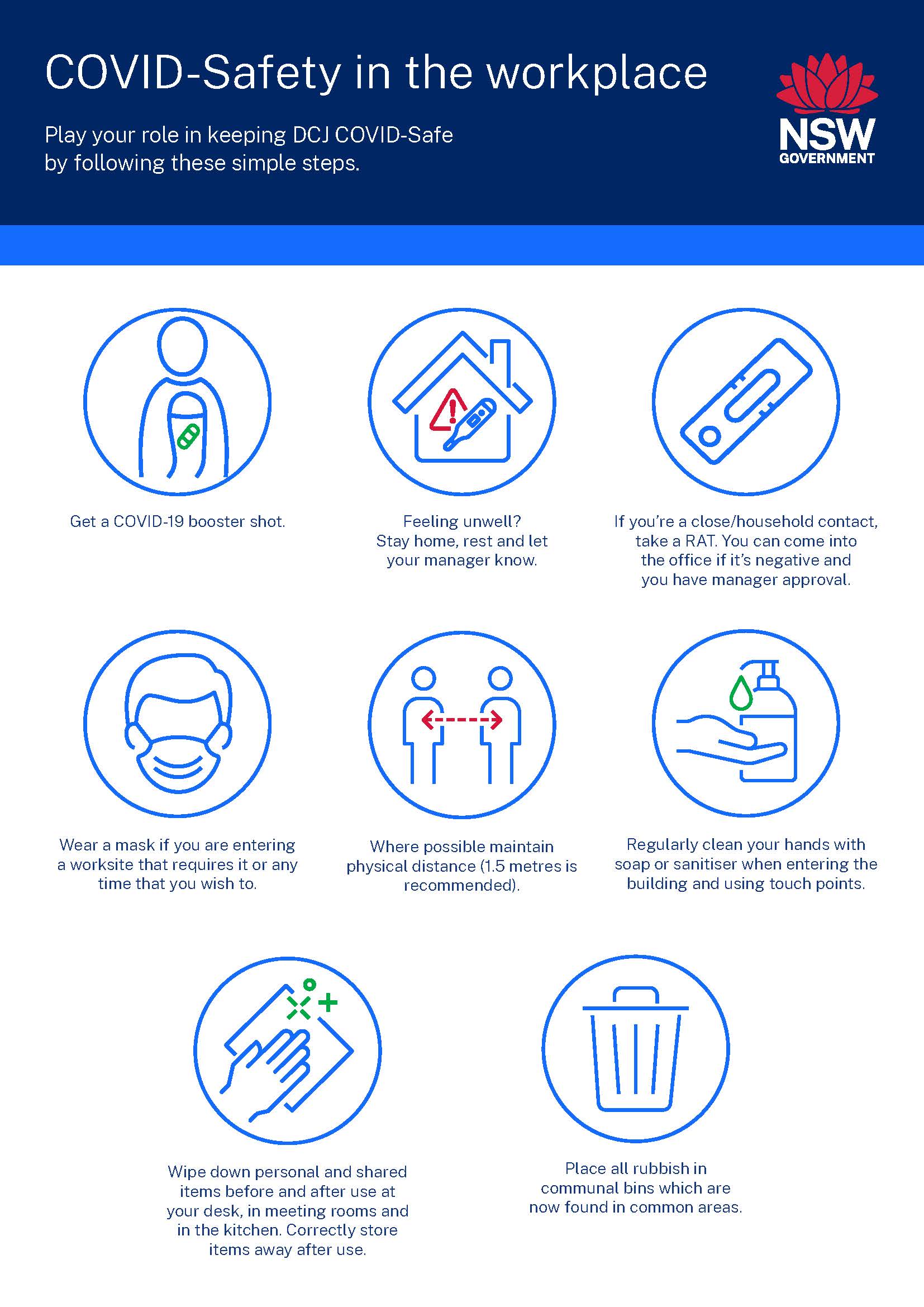Automatic language translation
Our website uses an automatic service to translate our content into different languages. These translations should be used as a guide only. See our Accessibility page for further information.
The information on this page is designed to support staff who are returning to DCJ workplaces. If your role is able to function under a flexible working arrangement, please consult with your manager on the best working arrangement for you, your team and our service users. Frontline staff should continue to follow working arrangements as set out by their manager and local leaders.

Our COVID-Safe workplace guide (PDF, 122.0 KB) outlines the simple steps for you to follow to help keep DCJ COVID-Safe.
Not feeling well? Stay away!
If you are feeling sick or showing any COVID-19 symptoms at all you must stay away from the workplace, including your normal workplace, another site, client visits or other outreach.
You must stay away from the workplace and self-isolate immediately if you have:
Tested positive to COVID-19? Stay home, rest and tell your manager
If you have tested positive to COVID-19 it is important that you tell your manager. If you have been in the workplace within a 48-hour period of becoming COVID-19 positive you will need to report this via SafetySuite. For information on how and when to report go to Managing COVID-19 cases in the workplace.
Please note: Due to the high-risk nature of custodial environments:
Book a desk before you attend the workplace
All staff must book a desk before attending the office. The desk booking process is in place to help track attendance for return to workplace purposes.
Staff with fixed desks do not need to use the booking tool but their manager needs to know when they are attending the workplace.
Keeping personal belongings sanitised
Before using personal belongings please wipe them and the desk down with the wipes provided. At the end of the day remember to wipe your desk and personal belongings down before storing them away.
When attending your workplace or visiting another workplace, please help us keep DCJ COVID-Safe by following all requests and processes.
Travelling on public transport
When commuting on public transport, you must follow all requirements, including wearing a facemask when using public transport, hire vehicles, taxis and rideshare services in Sydney, the Blue Mountains, Wollongong and Shellharbour local government areas. This includes when waiting for public transport at a bus or light rail stop, train station or ferry wharf. For the latest mask wearing advice, regularly check the NSW Health website.
Managers are encouraged to discuss with staff flexible work arrangements, including start and finish times where possible, to reduce the impact on public transport.
Managers or staff can contact strategicinitiatives@facs.nsw.gov.au if they have any questions about flexible work.
Travelling by car for work purposes
Staff are encouraged to wear a face mask when travelling for work with others in a vehicle. When using fleet vehicles staff must clean the inside before and after use with the wipes provided. Please follow additional operational arrangements as set by your division for vehicle travel.
Regional travel for work purposes
When travelling for work it is important to take precautions to avoid spreading COVID-19 by:
Where possible to minimise the risk of community transmission and in line with current work related travel policies (FACS) staff should explore the following alternate options to travelling:
It is crucial that DCJ staff do not visit Aboriginal communities if they:
The risk to Aboriginal communities from visiting workers could increase depending on the nature of the work, the locations the worker has travelled from and work practices.
To mitigate this risk, branches with staff who travel to rural and remote Aboriginal communities should provide detailed actions in their COVID-19 Safety Plan. These should include consideration of the issues outlined in this checklist.
Register your attendance
If directed by your manager, QR code check-in when entering a DCJ workplace. Highly controlled workplaces such as Correctional and Youth Justice centres and some courts may use other methods such as roster information.
Make sure you sit at the specific desk you prebooked. The desk booking system will be used to help us keep track of how office space is used.
Keep DCJ COVID-Safe. Use the four lines of defence
To help stop the spread of COVID-19 we ask that you practice the following four lines of defence when in DCJ workplaces:
Find your nearest waste bin
To keep our workplaces COVID-Safe we have removed personal waste bins from each desk and installed additional bins in communal areas for general waste. At 6 Parramatta Square, these can be found in the kitchen and printing areas, and toilets on each level.
Moving bins from desks to communal areas also supports the NSW Government’s commitment of having a resource productive public sector with less impact on the environment as outlined in the NSW Government Resource Efficiency Policy.
Using shared spaces and surfaces
When using shared spaces like meeting rooms, breakout areas and kitchens it is important that we keep them COVID-Safe. Play your part by:
The following resources on the DCJ intranet are available to assist you:
23 Nov 2022